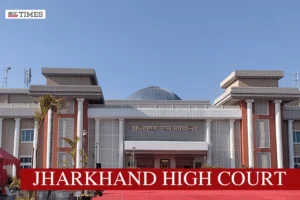Jharkhand High Court: In a criminal revision petition against the judgment dated 09-06-2017, passed by the Additional Sessions Judge 1st, Bokaro (‘the appellate court’), whereby the conviction of the petitioner-accused under Sections 3531, 5042/343 of the Penal Code, 1860 (‘IPC’) was affirmed, the Single Judge Bench of Anubha Rawat Choudhary, J.*, stated actual use of criminal force was not a condition precedent to attract Sections 3514 and 353 of IPC. Apprehension in the mind of the victim about use of criminal force created by gesture of the accused was sufficient. Such apprehension was reflected by the action, reaction and follow up action of the victim to tackle the situation and one such action was to call police to handle the situation when the public servant failed to persuade the accused person. Accordingly, the Court opined that the judgement passed by both the courts convicting the accused under section 353 and 504 IPC did not call for any interference.
Background
The prosecution case was based on the written report of the informant, the Executive Magistrate/ Resident Magistrate, Bokaro alleging that on 05-07-2003 at about 11:30 am, when the informant was working in his office room, three persons including the accused entered into his office room and one person disclosed his name and identity as Block Congress President and asked him as to why the informant had cancelled the death certificate of his man and asked him to immediately issue the death certificate and threatened him of dire consequences.
The informant further stated that the accused forcibly sat in the office chamber of the informant and started giving threat of his life and property and abused him in filthy language. The crowd gathered in his chamber and later, the staff of his office intervened and pacified the accused. On enquiry, the other two persons also disclosed their names. The Informant prayed for providing adequate security to him and for taking appropriate legal action against the accused.
Thereafter, based on the written report, a case was registered under Sections 353, 4485, 504/34 of IPC, against the accused persons. After completion of the investigation, the Investigating officer submitted the charge-sheet against the accused under the same sections.
The Trial Court considered the materials on record and recorded its findings that all the five witnesses have supported the fact about abusing the informant by the accused persons while he was discharging his duty in his office-cum-chamber, and they insulted him before public and subordinates. Thus, the Trial Court held the accused persons guilty of offence under Sections 353, 504 and 34 of IPC, but acquitted for offence under Section 448 of IPC. Thereafter, the appellate court upheld the conviction. Hence, the present appeal was filed.
Analysis, Law, and Decision
The Court observed that in the present case, the accused’s case was that no force/criminal force was used and hence, the ingredients of Section 353 of the IPC was not satisfied. The Court stated that considering the basic ingredients of definition of ‘assault’ under Section 351 of IPC, if a person entered the office chamber of a public servant, while the public servant was performing his official work and abuses and pressurizes the public servant to do a particular task in a particular manner and thereby prevented the public servant to perform his official duty and escalates the situation to such an extent that the public servant is compelled to call the police to control the situation, the act comes within the meaning of assault as defined under section 351 of IPC.
The Court stated actual use of criminal force was not a condition precedent to attract Sections 351 and 353 of IPC. Apprehension in the mind of the victim about use of criminal force created by gesture of the accused was sufficient. Such apprehension was reflected by the action, reaction and follow up action of the victim to tackle the situation and one such action was to call police to handle the situation when the public servant failed to persuade the accused person.
The Court stated that in the present case, there were concurrent findings that the accused persons abused the informant while he was discharging his duty and they abused and insulted him before public and subordinates and the informant was pressurized to issue death certificate which the informant was otherwise not agreeable to issue explaining the reasons. Considering the definition of assault as explained above, the Court stated that the facts revealed that the assault was committed by the accused persons and hence offence under Section 353 of IPC was committed.
Accordingly, the Court opined that the judgement passed by both the courts convicting the accused under section 353 and 504 IPC did not call for any interference. So far as the sentence was concerned, the Court observed that the appellate court had already taken a lenient view and reduced the sentence from 2 years to 6 months for each offence. Therefore, considering the manner and the nature in which the offence was committed, the Court was not inclined to reduce the sentence.
[Devendra Nath Choubey v. State of Jharkhand, 2024 SCC OnLine Jhar 3992, decided on 12-11-2024]
*Judgment authored by: Justice Anubha Rawat Choudhary
Advocates who appeared in this case:
For the Petitioner: Kaushik Sarkhel, Advocate;
For the Respondents: Priya Shrestha, Advocate.
1. Corresponding Section 132 of Nyaya Sanhita, 2023 (‘BNS’)
2. Corresponding Section 352 of BNS.
3. Corresponding Section 3(5) of BNS.
4. Corresponding Section 130 of BNS.
5. Corresponding Section 329(4) of BNS.

